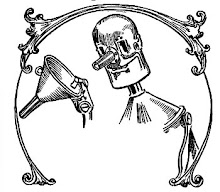"Leave no stone unturned." - Euripides
These words are true, but to what extent?
The physical world?
The mental one?
The spiritual?
I would say, and there are those who would disagree and agree, that there is no limit. Skepticism is one of the boldest, most straight forward tools we possess.
In the recent months it has become alarmingly clear that people at large have lost all sense of critical thinking.
Take one good look at the evolution vs. creationism "debate" to see people on both sides ripping into each other with fallacies that have been long debunked.
All of it points to a lack of reading, either through choice or just an inability to read for meaning.
Fret not, dear reader, for UK-Skeptics and others are here to save us from the wild fields of ad-hominem and other knee jerk idiocy.
But first, what is magical thinking?
Magical thinking is usually defined as any type of thinking that takes the locus of control away from the individual and attributes it to some supernatural force. Be it luck, fate, Thor, or the Christian "God." These forces are mysterious, unverifiable, and at times completely insane.
Critical thinking, on the other hand, is a review of the evidence at hand with a mind ready to ask hard questions. The hardest being 'What exactly am I being asked to swallow?'. Critical thinkers then look at the evidence and decide what it really means.
So why the lecture?
In short, because I will be posting on topics that are controversial and it will be up to you, the reader to look through my evidence and evaluate its validity to you. If you can't do that, you don't belong anywhere until you can.
Here are some of my guidelines:
1. Don't disregard experts. If it is about biology, listen to the biologists, if it is about space listen to the astronomers. The list goes on. People disregard these people who have dedicated their lives to a subject. Examples of this include the anti-vaccination (pro-infectious disease) movement and the creationists in dealing with evolution.
2. Don't believe everything you read, but believe something you read after thinking critically. Weigh it against the proof you think you have, and if your's holds up then by all means keep it close. But don't start ranting up and down just because some "puppet" spouted off something that contradicts you. I'm looking at you 9/11 Truthers and the rest of the conspiracy theory nuts.
3. Don't be a complete wanker when someone calls your bluff. Either come up with counter examples or shut up. What you "believe" isn't valid in a discussion of facts.
No idea is sacred. All of it can be questioned and should be. Failure to do so leads to dogma.
The problem is knowing where to draw the line. My personal opinion on the matter is to cut it off at the point that verifiable facts outweigh nonsense.
So, in closing, please enjoy a useful resource here.




No comments:
Post a Comment